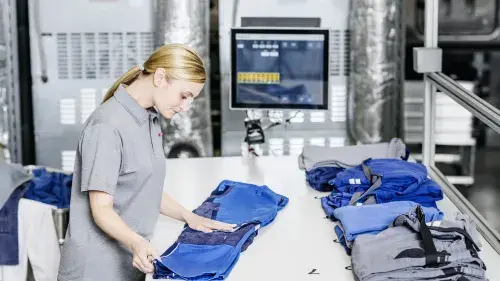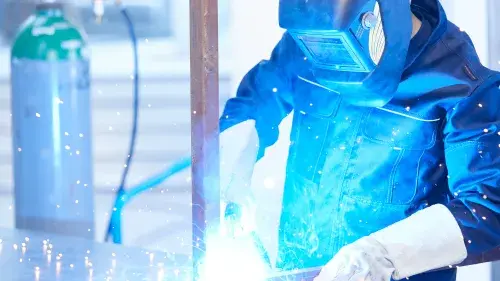Occupational safety is playing an increasingly important role in companies and businesses, with the focus on the protection of employees. Companies in Germany are bound by the Occupational Safety and Health Act to perform a workplace risk assessment on their premises. The most important obligations to which the employer is subject are laid down in this legislation. The assessment checks the stresses and impacts on the employees and the equipment among and with which they work. This also includes the selection of protective clothing, also known as personal protective equipment (PPE). Section 2 of Germany’s Ordinance on the Use of PPE stipulates that the employer is liable for the physical integrity of their employees.
Companies can outsource a large part of the responsibility by contracting the services of a workwear service provider, however. What sounds like a service for large companies is in fact worthwhile for small businesses as well. Werner Münnich, PPE expert at CWS, the German market leader in the field of rental workwear, explains how the service works.
For whom is the service model particularly suitable?
In principle, the rental service – also known as leasing – is suitable for every business and every company with employees who wear occupational clothing. Irrespective of how many employees they have. Companies and businesses in which protective clothing is used should at any rate opt for the rental service for reasons of safety. On the one hand, it is a matter of choosing the right clothing for each employee and, on the other, of ensuring professional care, maintenance and repair of workwear. There are a great deal of statutory regulations and risks that are impossible to comply with without professional service.
How does the textile service help ensure greater safety?
It starts with the careful selection as to which protective functions an employee’s work necessitates. Service providers such as CWS give companies in-depth advice concerning the specific circumstances and requirements. Each employee can thus be sure of being provided with the right PPE for their work.
There is also the fact that protective clothing, i.e. workwear with special protective functions such as providing heat and flame protection or with high-visibility protection, also requires special handling. With this in mind there are certain requirements, depending on the model, that define what particular characteristics the clothing should have. If, for example, the trousers are too long, they cannot simply be shortened. For high-visibility clothing, for example, there is the requirement that there must be a space of five centimetres between the reflector and the trouser leg-end. Any change to the clothing is subject to strict safety-related guidelines. Name or logo emblems to be applied on the clothing must be made of suitable material. They must be positioned correctly in each and every case; this depends on the clothing’s certification and the manufacturer information.
Expertise is also required where repairs to PPE are concerned. The yarns used in certain items of PPE must be flame-resistant, for instance, and the original materials must be used in each case of repair. PPE must be repaired with great care, since the fabric can break open and thus impair the protective functions for the wearer. Overall, it can be said that the entire handling of the clothing, from alterations and care right through to maintenance and repairs should be carried out by appropriately qualified personnel. This is also stipulated by law in the generally applicable SUCAM documents, i.e. the guidelines on the selection, use, care and maintenance of protective clothing. In this context, companies benefit from the experience and expertise of textile service providers with specialist knowledge of textiles, their processing and the relevant statutory requirements.
Are there any special laws of which one ought to be aware?
The sphere of occupational safety is subject to ultimately applicable state laws such as the aforementioned Occupational Safety and Health Act, the first 5 paragraphs of which define the most important duties and obligations incumbent on employers. The Occupational Safety and Health Act includes, for example, the Ordinance on Workplaces or the Ordinance on the Use of PPE, in addition to which there are regulations from employers’ liability insurance bodies and similar accident insurance institutions. These also regulate, for example, the interaction of different PPE items such as the type of gloves and the appropriate sleeve length of the workwear.
There are a growing number of regulations on the procurement of PPE as well. April 2019 saw the new PPE Regulation 2016/425 come into force; this imposes greater responsibility on companies and manufacturers. PPE clothing now has to be checked and certified anew every five years. Those responsible for the topic of workwear in a company should seek advice from a professional in cases of doubt. Consultation with us is completely non-binding and free of charge. CWS also offers the opportunity to try out workwear for a certain period of time. Customers can thus see for themselves the quality of the clothing.
Are there differences in quality between purchased and rental clothing?
In my personal and professional opinion, yes, there are indeed. Rental clothing is manufactured so as to last a long time. After all, we also take on responsibility for our customers and their employees. We clean, maintain and repair the clothing over the long term, which ensures a far longer lifespan. As regards purchased clothing, durability is less decisive than the first impression it makes.
What are the most common mistakes in the area of safety?
The implementation of safety measures in the workplace is often inadequately controlled and employees are not thoroughly informed about compliance with the measures. An occupational health and safety survey showed that only 53 percent of those who wear occupational clothing are regularly checked for compliance with safety regulations at their workplace. Moreover almost two thirds of the surveyed employees stated that they compromise on their safety in order to make their daily work easier, 44 percent of them sometimes omit essential parts of their protective equipment, such as protective goggles, gloves or helmets. While this makes working more comfortable, the fact is that the employees are putting themselves at risk by doing so. *
Do companies for the most part contract a service provider where protective clothing is concerned?
I think that is the actually the case where protective clothing is concerned, because the responsibility would otherwise be too great for the businesses. Even if health and safety officers are well trained, especially of course in large companies, and know the legal situation, they cannot take over the care and control of workwear autonomously.
Is there no alternative to a service provider?
Where PPE is concerned, no. The easiest and safest way for companies to obtain PPE is through a professional workwear service provider. The service provider not only takes on legal responsibility but also ensures that the protective clothing is properly laundered, maintained and repaired by trained staff. We at CWS use an officially certified treatment process for PPE, every phase of which is precisely specified.
PPE clothing must be continuously checked, especially if it is destined for long-term use. Some clothing requires what is known as a hydrophobization process, for example, this being a type of impregnation used to treat weatherproof or chemical protective clothing, among other things. This cannot be done by anyone not appropriately qualified and must be carried out evenly across the whole surface at a certain temperature. If our quality control reveals that the clothing is no longer safe for the wearer then we replace it immediately with a new item.
*Occupational health and safety survey, 2017, conducted by net-request on behalf of CWS
About CWS
CWS contributes to a healthier and safer future by way of innovative, sustainable and digital rental solutions. The CWS range is subdivided into products and services in the areas of Hygiene, Floor Care, Workwear, Fire Safety, Cleanrooms and Healthcare. All service areas of the company have been operating collectively as an integrated system provider under the name of CWS since April 2019.
CWS is a brand of CWS-boco Deutschland GmbH. CWS currently employs around 4,900 people in Germany. In 2018 the CWS-boco Group generated sales of 1.14 billion euros. CWS-boco is wholly owned by Franz Haniel & Cie. GmbH. You will find more information at www.cws.com
Daniela Rödig
Senior Integrated Marketing Manager
CWS Workwear International GmbH
Dreieich Plaza 1A
D-63303
Dreieich
Germany
Bettina Göttsche / Christina Sattler
HOSCHKE & CONSORTEN Public Relations GmbH
Heimhuder Straße 56
20148
Hamburg
Germany



